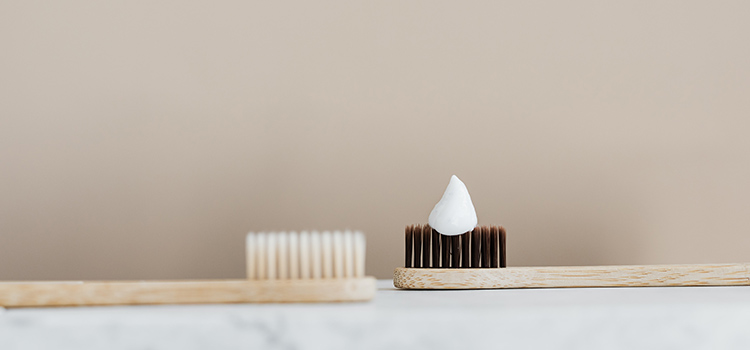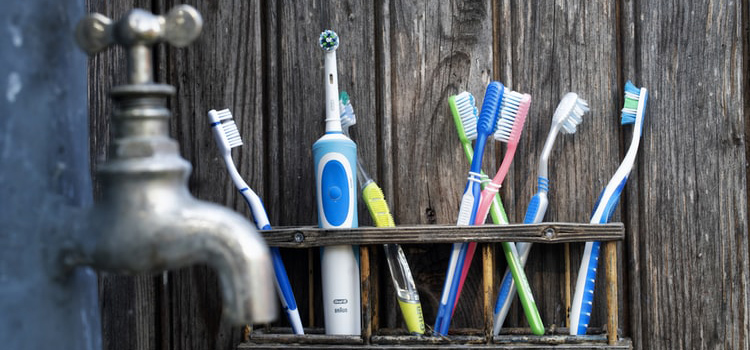Best Toothpaste For Sensitive Teeth
21st Jun 2020

If uncomfortable twinges in your teeth make you dread essential, everyday activities like eating, drinking, and brushing your teeth, there's no need to power through the pain. Using a toothpaste designed for sensitive teeth can offer real relief, and there are plenty of products to choose from. Keep reading to learn more about tooth sensitivity and how to choose the best toothpaste for sensitive teeth. We'll also discuss other ways to keep sensitive teeth healthy.

Signs and Causes of Tooth Sensitivity
Does eating or drinking something hot, cold, sweet, or acidic make you wince? Will inhaling a deep breath on a cold morning send a shot of pain through your teeth? Is brushing or flossing uncomfortable? Do you shudder if you use an alcohol-based rinse? If so, sensitive teeth could be to blame for your discomfort.
Sensitivity comes in varying degrees of severity. Sometimes called dental hypersensitivity, it can involve one or more teeth. Sensitive teeth are generally a sign that the protective barrier of tooth enamel has been weakened or compromised.
Related Articles:
- Types Of Retainers For Teeth
- How Long Does A Night Guard Last?
- Vitamins And Supplements To Treat TMJ
Enamel and Tooth Sensitivity
Tooth enamel is the hardest substance in the human body. In healthy teeth, a tough outer layer of enamel protects the portion of the tooth that sits above the gum line. Underneath that enamel shield is a softer layer of dentin that's peppered with microscopic hollow tubes called tubules. Beneath the dentin is the pulp, which contains nerve tissue. The tubules offer a clear pathway to those nerves, so when the enamel is compromised, sensitivity often results.

Unfortunately, the protective coating of enamel isn't invincible. Some people naturally have thinner enamel than others, increasing their risk of sensitivity. However, anyone can develop sensitive teeth if their enamel is damaged in one of the following ways:
- Tooth Decay:
Tooth decay starts with plaque buildup. If left unchecked, this film of bacteria and grime hardens into tartar, which can set the stage for bad breath and cavities.
- Tooth Erosion:
Acidic foods and beverages can eat away at your enamel. Health conditions like gastroesophageal reflux and bulimia bring up acid from the stomach, which can also cause tooth erosion.
- Gingivitis:
A form of gum disease, gingivitis causes the gums to recede. With no enamel coating to protect it, the exposed root is a chink in the tooth's natural armor.
- Injury:
Biting down on something hard or receiving direct tooth impact in an accident can lead to cracked or fractured teeth. The damaged enamel can lead to hypersensitivity.
- Tooth Grinding:
Repeatedly grinding your teeth during the day or night wears them down, thinning the enamel.
- Tooth Brushing:
Overly aggressive brushing or using the wrong tools can harm enamel.
- Dental Treatments:
Teeth whitening treatments can spur sensitivity. Teeth may also be temporarily sensitive after dental work, but this generally subsides.
Why Tooth Sensitivity Matters
Sensitive teeth deserve special attention. Like teeth yellowed by tartar, gingivitis, or bad breath, this pain is a red flag. It can indicate a serious dental issue is either present or soon will be. Or, it may reveal a misstep in your oral care routine.
Alerting your dentist to tooth sensitivity allows you to promptly identify problems and protect your smile. It can also help reduce pain and prevent further damage to the enamel, dentin, tubules, and gums.

Choosing a Sensitivity Toothpaste: What to Look For
If tooth hypersensitivity lingers after any underlying dental issues have been dealt with, sensitivity toothpaste can ease the discomfort. These products work by numbing the nerves, blocking the tubules that lead to the nerves, or a combination of these desensitizing strategies.
Sensitivity toothpastes are easy to recognize. Most tout their suitability for sensitive teeth on their labels. However, not all of these products are the same. When shopping for a good sensitivity toothpaste, look for the following:
- Approval from the U.S. Food and Drug Administration: Any toothpaste that's meant to prevent cavities must be FDA approved. Fluoride, the chemical generally used to fend off cavities, is an over-the-counter drug. Toothpaste that contains it must win FDA approval.
- The American Dental Association (ADA) Seal of Acceptance:Toothpaste with the ADA Seal of Acceptance has been proven safe and effective by the objective standards set by the ADA Council on Scientific Affairs.
- Effective Ingredients: Sensitivity toothpastes avoid irritants and incorporate desensitizing ingredients that decrease hypersensitivity with repeated use. For example, potassium nitrate acts on nerve synapses, numbing the nerve. Meanwhile, stannous fluoride covers exposed tubules, shielding the nerves.

Beyond Sensitivity: What Else to Look for in Toothpaste
Like many products, toothpaste can multitask. That means you can find toothpaste that has benefits beyond catering to sensitive teeth.
Teeth Whitening Toothpastes
If you're in the market for a toothpaste that will brighten your smile, opt for a whitening toothpaste that also protects sensitive teeth. When preventing cavities is a priority, choose a fluoride toothpaste that treats hypersensitivity.
Natural Toothpastes
Are you eager to avoid the artificial sweeteners, dyes, and chemical cleansers like sodium lauryl sulfate that lurk in some toothpastes? Consider a natural toothpaste that uses organic ingredients. It's not unusual to find fluoride-free toothpastes in this category, which some consumers welcome. However, keep in mind fluoride is the only toothpaste ingredient that's been proven to strengthen enamel and prevent cavities. That's why dentists only recommend products with fluoride. Fortunately, many natural toothpastes do contain it, so you can have your natural toothpaste and your fluoride too.
Home Ingredients
What about home ingredients like baking soda and activated charcoal? Both substances are inexpensive and capable of removing surface stains. While baking soda pastes are fairly soft, charcoal particles can be irritating. They may be too abrasive for sensitive teeth and tender gums.
The absence of fluoride is another concern. Neither baking soda nor charcoal contains fluoride, and forgoing fluoride can increase your vulnerability to cavities. If you're interested in brushing with baking soda or charcoal, you may want to use them in conjunction with other oral care products. Alternatively, you could select a baking soda or charcoal toothpaste from a trusted manufacturer. Just check to see if it’s also a fit for your sensitive teeth.

Sensitivity Toothpastes to Consider
A wide range of sensitivity toothpastes can be found on store shelves, and online retailers like Amazon offer even more choices. There are several products worth considering:
Sensodyne Pronamel Fresh Breath:
From a trusted name among desensitizing brands, this SLS-free toothpaste combines the benefits of an anticavity toothpaste with minerals that strengthen enamel. This Sensodyne toothpaste also contains mint for a pleasant minty taste and fresh breath.
Tom's Of Maine Antiplaque & Whitening Toothpaste:
This natural toothpaste contains no fluoride, animal ingredients, artificial sweeteners, preservatives, colors, or flavors. Never tested on animals, it promises fresh breath and helps prevent tartar buildup.
Colgate Sensitive Toothpaste, Complete Protection:
In addition to offering clinically proven sensitivity relief, this toothpaste helps protect teeth and gum health. It also freshens breath.
Hello Oral Care Sensitivity Relief Toothpaste:
Made in the U.S., this vegan toothpaste has fluoride, aloe, and coconut oil. It doesn't have dyes, artificial sweeteners, SLS, gluten, or preservatives.
Arm & Hammer Sensitive Teeth & Gums:
Powered by baking soda, this toothpaste is tough on plaque but easy on enamel. It offers extra whitening for your smile.

More Strategies for Keeping Sensitive Teeth Healthy
Choosing the best toothpaste is a smart move, but there are other ways you can help keep your sensitive teeth healthy:
Have A Solid Oral Hygiene Routine:
Experts recommend gently brushing your teeth twice a day. You should use a soft toothbrush and appropriate toothpaste. To clean your hard-to-reach spaces, floss daily. Rinse with mouthwash to combat germs and freshen breath.
Use An Electric Toothbrush:
Electric toothbrushes offer an easy, efficient way to remove plaque. Many people also find a light touch is better for teeth, so electric toothbrushes are a good choice if you're prone to aggressive brushing.
Be Careful With Whitening Treatments:
Whitening treatments can trigger sensitivity. Follow directions carefully, don't overuse these products, and be mindful of how they impact your sensitivity.
Seek Treatment For Underlying Health Issues:
Health issues such as bulimia, gastroesophageal reflux, bruxism, gum recession, and tooth decay can make tooth sensitivity worse. Getting the right treatment for your condition by discussing it with your doctor or dentist.
See Your Dentist For Checkups:
Yearly checkups with your dentist verify that your oral health routine is doing its job.
There's no reason to let tooth sensitivity steal your smile. Combining the right sensitivity toothpaste with a strong oral health care regimen can improve your comfort and protect your oral health.
If tooth grinding aggravates your sensitive teeth, you may suffer from bruxism. In this case, a mouthguard offers an effective, drug-free way to protect your enamel.
Related Articles:
Pro Teeth Guard offers affordable, custom-fit mouthguards online. Our night guards are crafted in a professional dental lab using professional materials and processes. They're effectively the same oral appliances that dentists provide, but they cost substantially less. Contact us today to learn more.

- Most Popular
- Hard Outside, Soft Inside
- 2MM Thick
- Moderate / Heavy

- Most Durable
- Hard Materials
- 1.5MM Thick
- Heavy / Severe

- For Day Time Use
- Thin, Barely Visible
- 1MM Thick
- Light / Moderate

- For Clenching
- Flexible & Soft
- 1.5MM Thick
- Light / Moderate

